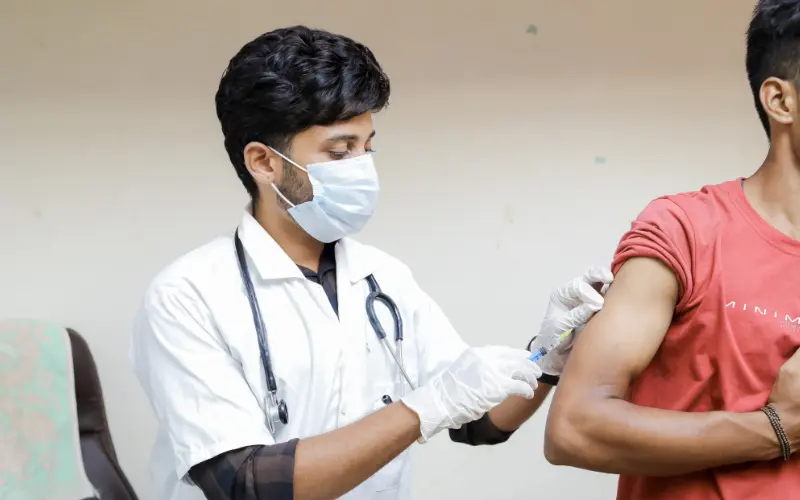Lifestyle Diseases in Your 20s: The Health Time Bomb!

REVIEWED BY DR. SHOKET ALI (MD MEDICINE) on 8 August 2025.
You wake up late after a night of binge-watching. Breakfast is skipped. Lunch is a quick burger between meetings. Evenings are spent scrolling endlessly while convincing yourself that you will hit the gym tomorrow. Sounds familiar?
This is the new normal for many in their 20s, a decade where we feel “invincible.” But here’s the truth: lifestyle diseases do not wait for your 40s anymore. They are quietly building up in your 20s, often without symptoms, until one day they no longer stay silent.
Diabetes, hypertension, obesity, and even mental health disorders are no longer distant threats. They are showing up earlier than ever, triggered by everyday habits we barely think about.
The good news is that you can defuse this time bomb. In this article, I will walk you through the most common lifestyle diseases affecting young adults, the daily habits that fuel them, and the simple steps you can take to reverse the damage before it is too late. Let’s begin by understanding what is really happening inside your body in your 20s.
The 20s Illusion: Why Young Doesn’t Always Mean Healthy

Your 20s are supposed to be the healthiest years of your life. Your body bounces back from late nights, you recover quickly from minor illnesses, and you feel like you can eat anything without consequence. It creates an illusion that your health is unshakable.
But the reality is different. Your 20s are when the foundation for your long-term health is being laid. The habits you develop now, both good and bad, shape the way your body functions for decades to come.
Research shows that conditions like type 2 diabetes, hypertension, and even heart disease are being diagnosed in younger adults at alarming rates. These diseases do not appear overnight. They build silently, often over years of poor diet, lack of exercise, excessive screen time, and unmanaged stress.
I have seen young patients in their mid-20s walk into hospitals shocked by diagnoses they thought were reserved for “older people.” It is a harsh wake-up call: youth does not guarantee health.
The sooner you acknowledge this reality, the sooner you can take steps to protect yourself.
The Silent Diseases Catching Young Adults Off Guard

Lifestyle diseases are called “silent” for a reason. They often develop slowly, with little to no obvious symptoms, until they reach a point where medical intervention becomes unavoidable. In your 20s, these health issues rarely make themselves known, but they are quietly changing the way your body works.
Let’s look at the most common ones affecting young adults today:
1. Diabetes and Pre-diabetes
You do not need to be overweight or in your 40s to be at risk for diabetes. Type 2 diabetes is now being diagnosed in people as young as 20. Poor dietary habits, constant snacking on processed food, and sugar-loaded beverages are leading to early insulin resistance.
According to the International Diabetes Federation, 1 in 10 adults under 30 is already at risk of diabetes. The scariest part is that pre-diabetes often has no symptoms. Without early testing, you may not even know your blood sugar levels are creeping up.
2. Hypertension and Heart Health Risks
High blood pressure is no longer an “old person’s disease.” Stressful work environments, disrupted sleep cycles, smoking, alcohol, and salty processed foods are making young adults vulnerable to early-onset hypertension.
Unchecked high blood pressure can silently damage your heart, kidneys, and even your brain. According to the World Health Organization, over 1 in 4 adults aged 20 to 39 have elevated blood pressure, and most do not know it.
3. Obesity and Metabolic Disorders
A sedentary lifestyle combined with calorie-dense, nutrient-poor diets is causing a surge in obesity among people in their 20s. Beyond appearance, excess weight leads to metabolic syndrome, which is a combination of high cholesterol, high blood pressure, and insulin resistance. This significantly increases the risk of heart disease and diabetes.
This is not about “just losing a few kilos.” It is about addressing a health condition that affects your hormones, energy levels, and long-term wellness.
4. Mental Health Concerns
While often overlooked, mental health is deeply tied to physical health. Excessive screen time, social media pressures, work-related stress, and poor sleep are fueling rising cases of anxiety, depression, and burnout in young adults.
Ignoring these warning signs does not make them go away. Chronic stress can worsen physical conditions like high blood pressure and digestive issues, creating a dangerous cycle.
The Daily Habits Damaging Your Health

Most lifestyle diseases in your 20s come from habits that seem harmless at first but take a toll over time. Here are the key ones to watch out for:
Too much screen time:
- Late-night scrolling disrupts your sleep
- Poor posture from long sitting hours leads to back and neck pain
- Excessive digital stimulation fuels anxiety and stress
Poor eating habits:
- Skipping breakfast or eating at irregular times weakens your metabolism
- Processed and fast food overload your body with sugar, salt, and unhealthy fats
- Nutrient deficiencies creep in when you neglect balanced meals
Sedentary lifestyle:
- Long hours of sitting slow down your metabolism and affect heart health
- Lack of movement reduces stamina and weakens muscles over time
- Even short activity breaks during the day are often skipped
Chronic stress and no downtime:
- Constant mental pressure raises cortisol levels, which impacts weight and sleep
- Lack of proper relaxation affects both your mood and physical health
The good news is that these habits can be reversed with conscious, consistent changes, which we will discuss next.
Practical Steps to Reverse the Damage
You do not need a complete lifestyle overhaul overnight. Small, consistent changes can make a big difference.
Make exercise non-negotiable:
- Start with 20–30 minutes of walking or home workouts daily.
- Use stairs instead of elevators and take short activity breaks during work.
- Try stretching or yoga to improve flexibility and reduce stress.
Fix your eating habits:

Fix your eating habits:
- Include more whole foods like fruits, vegetables, and lean proteins.
- Reduce sugary drinks, packaged snacks, and fried foods.
- Eat at regular intervals to maintain energy and stabilize blood sugar levels.
Prioritize quality sleep:
- Maintain a fixed bedtime and wake-up schedule.
- Avoid screens at least 30 minutes before sleep.
- Create a calming bedtime routine to improve rest quality.
Manage stress effectively:

- Practice mindfulness techniques like meditation or deep breathing.
- Schedule downtime for hobbies or social connections.
- Avoid overcommitting yourself and learn to set boundaries.
Reduce screen dependence:
- Use apps to track and limit screen time.
- Schedule “no-phone” hours during meals or before bed.
- Replace unnecessary scrolling with activities that refresh you.
Making these changes is easier than it seems when done one step at a time.
Important Health Tests to Get Every Year in Your 20s

Preventive health checkups are essential, even when you feel healthy and well. These tests help detect issues early, when they are easiest to treat:
- Blood Sugar & HbA1c Test: To detect diabetes or pre-diabetes.
- Lipid Profile: To monitor cholesterol levels and heart health.
- Blood Pressure Check & ECG: For early signs of hypertension or heart issues.
- Thyroid Function Test: To ensure hormonal balance.
- Vitamin D & Vitamin B12 Levels: To address common deficiencies in young adults.
- BMI & Body Composition Analysis: To track weight, fat percentage, and overall fitness.
- Mental Health Screening: To assess stress, anxiety, or depression risks.
Pro tip: A comprehensive preventive health checkup at Raja Hospital combines these tests in one visit, giving you a clear picture of your overall health.
When to Seek Medical Help
Even with healthy habits, it is important to know when to see a doctor. Do not ignore these warning signs:
- Persistent fatigue or unexplained tiredness.
- Sudden or unexplained weight gain or loss.
- Frequent headaches, dizziness, or blurred vision.
- Irregular heartbeat or chest discomfort.
- Continuous stress, anxiety, or depressive thoughts.
- Digestive issues that do not resolve with simple changes.
Taking action early can prevent small issues from becoming serious health problems.
Frequently Asked Questions:
1. What are the most common lifestyle diseases in people in their 20s?
The most common lifestyle diseases in this age group include type 2 diabetes, hypertension, obesity, and mental health issues like anxiety and depression. These are largely driven by poor diet, sedentary habits, and chronic stress.
2. Can lifestyle diseases be reversed?
In many cases, yes. Early intervention through improved diet, regular exercise, stress management, and timely medical care can help reverse or significantly control these conditions.
3. How often should someone in their 20s get a health checkup?
It is recommended to have a comprehensive health checkup at least once a year. This helps detect potential issues early and allows for preventive measures.
4. Why should I get tested if I feel healthy?
Many lifestyle diseases develop silently without obvious symptoms. Regular tests can detect hidden problems early, making treatment easier and more effective.
5. What is included in a preventive health checkup?
A preventive checkup usually includes blood sugar tests, lipid profile, thyroid function tests, vitamin level checks, blood pressure monitoring, BMI analysis, and mental health assessments.
Struggling with same?
Book Your Appointment With Our Expert Doctors

Conclusion
Your 20s are often seen as a time to live freely without worrying about health. But the reality is that the choices you make today quietly shape your future. Lifestyle diseases like diabetes, hypertension, and obesity do not appear overnight. They build over time, fueled by habits that feel harmless now.
The good news is that you can change course. With small, consistent steps such as eating better, staying active, managing stress, and getting regular health checkups, you can protect yourself from problems that many only recognize too late.
Your 20s are not just about building your career or social life. They are also about building your health.
Take the first step today.Schedule a preventive health checkup at Raja Hospital and invest in a healthier future.
